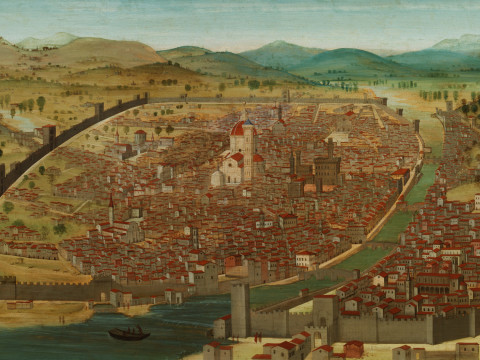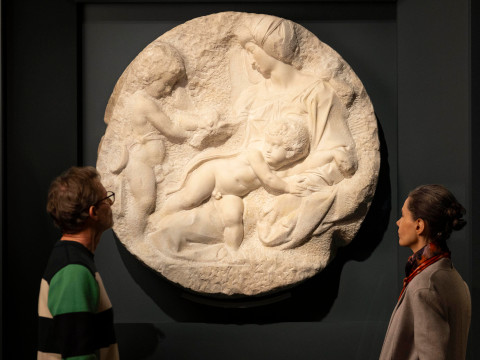
Ali Smith on David Hockney and the poetry of spring
By Ali Smith
Published on 14 June 2021
From Virgil's 'Georgics' to T.S. Eliot's 'The Waste Land', novelist Ali Smith explores the spirit of spring in poetry
From the Spring 2020 issue of RA Magazine, issued quarterly to Friends of the RA.
I’ve been reading Kimberly Johnson’s translation of Virgil’s Georgics. The word georgics might translate into English as something like earthworks, and these are poems about the pleasure and the wisdom – as opposed to the warring and fame of emperors, politicians, warriors etc – of an everyday life lived working, and working with, the earth.
In some senses it’s an early, very practical How-To book which respectfully but firmly suggests a different politics, one of caring for bees and trees, animal husbandry, and advises a kind of timeless self-government, by reading the earth, the signs in the stars, the weather, the habits of the creatures and plants with which we coexist, and by offering new readings of some very old stories.

In it, Virgil hymns spring for the essential ‘respite’ it is between the extremes of winter and summer, a respite that engenders all florescence, whose trackless thickets trill with birdsong as its fields unloose their bosom. So far so springlike. But then he taps into a deeper root:
Such days, I fancy, dawned upon the birth
of the infant earth, and such a course they kept:
spring it was, spring the wide world observed –
the eastwinds spared their wintry blasts,
when first the cattle drank in light, and the earthen line
of men reared up its head from the stiff fields
and beasts were released to forests and stars released to sky.
This spring goes not just to the physical and conceptual start of things in that vivid image when the clay of the fields, as if for the first time, forms into humanity, but also to a beginning of human consciousness, the first noticing moment.
Beginnings of all kinds. Pliability, an unfreezing, awakening. Wild sudden growth. Release. Energy. Hope. Lifeforce. Threshold. It’s about all these things, the word spring, a word coined for the coiled energy, the upward thrust at this time of year of sap through roots and trunks, buds through cold branch-ends. Spring is the word that replaced the Old English word for this time of the year, lencten, a word which signalled the lengthening of daylight (and gave us the word Lent) and the word spring leaps right out of itself like pent-up water from a suddenly opened source. It’s bitter rain, sweet rain; its fertility is tough, all opposites, and tough to bear: cold heat; old tree splitting into new leaf. You know it for the first time, again, every year, in the shock of the rare mild day that spring sends ahead of itself in January, and then again on that first February evening when you catch the scent, the difference, in the air. Maybe spring’s the real new year, not January 1st at all.

You can sense it every time Hockney makes visible the unexpected shock of colour in the dark of a body of bare trees. You can see it every time he catches the moment of its merry falling-over-itself, the swing of a branch loaded with not-snow, spring like the hinge on the seasonal door.
She doth carry June in her eyes, in her heart January (that’s Thomas Carew); in spring for the first time all over again we know that things can change. Spring’s always radical, stirring dull roots with spring rain (that’s T.S. Eliot), always about the force that through the green fuse drives the flower (that’s Dylan Thomas), and that’s another thing about the force of spring, it’s a full-on poetry. A Light exists in Spring / Not present on the Year / At any other period (that’s Emily Dickinson, whose ears open in this poem to the possibilities of voice, or a whole new consciousness, for a moment, in the things and places we mundanely deceive ourselves are languageless; it almost speaks to me, she says of the specific light spring throws on things, the specific language of spring).
Spring, a word coined for the coiled energy, the upward thrust at this time of year of sap through roots and trunks, buds through cold branch-ends
Ali Smith
But as soon as you start to think of poems about spring the source spurts open and nothing is so beautiful as budding twigs spread out their fan to leaping combustion when the world is mud-luscious the cherry hung with snow all around us the blossoms flurry down merrily merrily like something almost being said the leaves that aren’t yet there blow across the stagnant world stretching miles of green limbs bless the winter cluster of the bees they taste the spring April sunshine it’s a blessing so that the trowel in my hand will have something to push against.
That’s – well, I’ll leave you to trace the sources of these spring poem-splinters yourself. Think of it as a spring game, at the outset a bit tough, in the end? A wake-up call.
Like spring.
Ali Smith is the author of many works of fiction, including
her recent seasonal quartet of novels published by Penguin.


Become a Friend to receive RA Magazine
As well as free entry to all of our exhibitions, Friends of the RA enjoy one of Britain’s most respected art magazines, delivered directly to your door. Why not join the club?
Related articles

A love letter to the gallery gift shop
18 November 2024

Painting the town: Florence in 1504
15 November 2024

Moving a masterpiece
7 November 2024